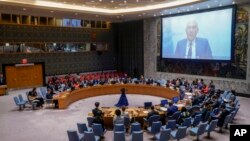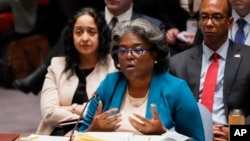The U.N. human rights chief said Thursday that many of the severe and widespread rights violations in North Korea are directly linked to the regime’s pursuit of nuclear and ballistic missile technology.
“Many of the violations I have referred to stem directly from, or support, the increasing militarization of the DPRK,” High Commissioner for Human Rights Volker Türk told a special meeting of the Security Council on human rights in North Korea.
“For example, the widespread use of forced labor – including labor in political prison camps; forced use of schoolchildren to collect harvests; the requirement for families to undertake labor and provide a quota of goods to the government; and confiscation of wages from overseas workers – all support the military apparatus of the state and its ability to build weapons,” he said.
Türk noted the notoriously repressive nation has become even more so since the borders were shut early in 2020 as the COVID-19 pandemic took hold in Asia. The high commissioner said measures, including strict controls on travel within North Korea, the closure of markets and domestic forced labor, have all contributed to a worsening situation for economic and social rights in the country.
“Militarization also promotes the systematic exploitation of the population,” added Elizabeth Salmon, U.N. special rapporteur for the situation of human rights in North Korea. “The leadership in the DPRK continues to demand its citizens to tighten their belts so that the available resources could be used to fund the nuclear and missiles program.”
DPRK is the abbreviation for the North Korea’s official name, the Democratic People’s Republic of Korea.
The United States holds the 15-nation Security Council’s rotating presidency this month and called for Thursday’s meeting along with Albania and Japan. It is the first time since 2017 that the council is holding a public session on the rights issue in North Korea and its link to international peace and security.
“Colleagues, we cannot have peace without human rights,” Ambassador Linda Thomas-Greenfield told council members. “And the DPRK is a case in point.”
Defector's story
North Korean defector Ilhyeok Kim told council members he was forced to do unpaid farm labor from an early age instead of going to school. His family risked their lives and fled to South Korea in 2011 when he was a teenager.
"The North Korean government has no policy to help us; the government turns our blood and sweat into a luxurious life for the leadership and missiles that blast our hard work into the sky,” he said. “We used to think that the money spent on just one missile could feed us for three months, but the government doesn’t care, and is only concerned with maintaining their power, developing nuclear weapons and creating propaganda to justify their actions.”
China and Russia both regularly object to the discussion of North Korea’s human rights in the Security Council, saying there are other U.N. forums for such conversations. China’s envoy said the meeting was “irresponsible, unconstructive and an abuse of the council’s power,” while Moscow’s deputy ambassador said it was a “cynical and hypocritical” attempt by the U.S. and its allies to pressure Pyongyang.
North Korea’s ambassador did not attend the session, but its foreign ministry put out a statement two days ahead of the council meeting criticizing it.
“The DPRK resolutely denounces and rejects the despicable 'human rights' racket of the U.S. as a wanton infringement and a grave challenge to the dignity and sovereignty of the DPRK,” said the statement from Kim Son Gyong, vice minister for international organizations.
Following the meeting, the U.S. envoy was joined by delegates from more than 50 nations and the European Union in a joint statement calling on countries to hold Pyongyang accountable for its rights abuses and urging full implementation of existing council resolutions on North Korea’s illicit weapons programs.
Pyongyang has launched scores of ballistic missiles and several intercontinental ballistic missiles this year. It regularly blames the tense situation on the Korean Peninsula on joint military exercises that the United States and South Korea carry out and says its missile program is meant to deter and “strike fear” into its enemies.
In 2014, the U.N. Commission of Inquiry found that North Korea’s rights violations had risen to the level of crimes against humanity. The panel’s report found the regime had used “extermination, murder, enslavement, torture, imprisonment, rape, forced abortions and other sexual violence, persecution on political, religious, racial and gender grounds, the forcible transfer of populations, the enforced disappearance of persons and the inhumane act of knowingly causing prolonged starvation.”





